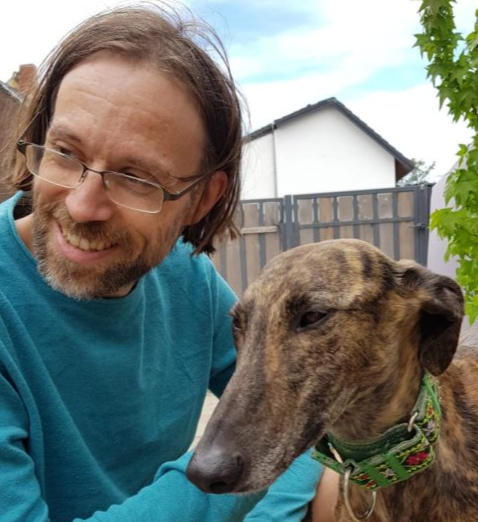Christian Straßer
Table of Contents
 Christian is a professor of Logic in Philosophy and Artificial Intelligence at the Institute for Philosophy II at Ruhr University Bochum. He is specialized in non-monotonic logics, defeasible reasoning, argumentation, deontic and adaptive logics. He is interested in utilizing formal methods (such as logical or computational methods) in philosophy. Beyond logic his research interests spread into the philosophy of science and social epistemology.
Christian has published \( {\ge}100 \) academic papers and books. He has been awarded the Sofja Kovalevskaja research prize by the Alexander von Humboldt-Foundation (1.4M€) and generated ca. 3.5M€ research income. His CV is here (a pdf here), his list of publications here and his talks here. His google scholar can be found here.
Christian is a professor of Logic in Philosophy and Artificial Intelligence at the Institute for Philosophy II at Ruhr University Bochum. He is specialized in non-monotonic logics, defeasible reasoning, argumentation, deontic and adaptive logics. He is interested in utilizing formal methods (such as logical or computational methods) in philosophy. Beyond logic his research interests spread into the philosophy of science and social epistemology.
Christian has published \( {\ge}100 \) academic papers and books. He has been awarded the Sofja Kovalevskaja research prize by the Alexander von Humboldt-Foundation (1.4M€) and generated ca. 3.5M€ research income. His CV is here (a pdf here), his list of publications here and his talks here. His google scholar can be found here.
A short bio
After majoring both in Philosophy and in Computer Science at the University of Passau in 2006, and after a short (but very pleasurable) period as teaching assistant in philosophy in Passau, Christian combined his passion for philosophy and formal systems by enrolling as a PhD-student in nonmonotonic logic at the Centre for Logic and Philosophy of Science at Gent University. Thanks to the excellent environment and the outstanding support by his supervisors Joke Meheus and Diderik Batens he obtained a PhD degree in 2011. His PhD-thesis ended up in book form as “Adaptive Logic and Defeasible Reasoning. Applications in Argumentation, Normative Reasoning and Default Reasoning” (Trends in Logic series, Springer, 2014).
After some years as a PostDoc in Gent he received the Sofja Kovalevskaja Award by the Humboldt Foundation (1.4M €), for which he was nominated by Heinrich Wansing (Bochum). The metaphoric suitcase full of research funding was spent to establish the research group in Bochum whose main focus was the study of the logical foundations of formal argumentation. That worked out pretty well in large portion due to the fact that Christian had a very lucky hand in selecting the members of the group: the PhD students Jesse Heyninck (now: postDoc at TU Dortmund) and AnneMarie Borg (now: Assistant Prof in Utrecht) (both co-supervised with Ofer Arieli) and the PostDocs Mathieu Beirlaen (now in the industry) and Pere Pardo (now PostDoc in Luxembourg). For the achievements of the group see here.
In 2020 Christian was appointed as a full professor in “Logic in Philosophy and Artificial Intelligence”. Shortly afterwards he was appointed as a BOF research professor (at the level Hoogleraar) at Ghent University, but declined the fantastic offer (with a tear in one eye) due to an even more attractive counter-offer from Bochum. The counter-offer includes the establishing of a new research group in Autumn with his partner, Dunja Seselja. You find the webpage of the group Reasoning, Rationality and Science here.
Some more on his research interests
Christian’s core interests circle around non-monotonic logic and defeasible reasoning. He published on many systems of nonmonotonic logic, from adaptive logic, to default logics, KLM-systems, to formal argumentation. He also maintains the entry on nonmonotonic logic of the Stanford Encyclopedia of Philosophy. While nonmonotonic logics are typically based on a classical core logic, he is also interested in using other logics known from philosophy (such as paraconsistent and relevant logics). He is fascinated by dynamic proof theories and published on them both in the context of adaptive logics as well as formal argumentation. Together with Ofer Arieli (University College Tel Aviv-Yaffo) has has a long-term collaboration on sequent-based argumentation, with over 15 papers out to date, many together with AnneMarie Borg. Besides that he worked on the meta-theory of assumption-based argumentation and ASPIC, often together with Jesse Heyninck.
Another of his core interests is deontic logic, in particular its nonmonotonic aspects. He worked on adaptive deontic logics, default deontic logics, input-output logic, and more recently on deontic structured argumentation. Together with Agata Ciabbattoni (TU Vienna) and Leon van der Torre (Luxembourg) he recently kick-started the LoDEx project on Logical Methods on Deontic Explanation (webpage).
Finally, Christian is also interested in philosophy of science, from general philosophy of science to social epistemic aspects. In recent years the team Dunja Šešelja (Eindhoven), AnneMarie Borg (Utrecht), Daniel Fry (Heidelberg), and Christian have developed an agent-based model of scientific inquiry, which already lead to several publications.
Collaborations
Christian loves to collaborate, cause its fun and a way to learn a lot from great people. His collaborators include:
- Aldo Antonelli (nonmonotonic logic)
- Ofer Arieli (formal argumentation, inconsistency)
- Diderik Batens (adaptive logic)
- Mathieu Beirlaen (deontic and adaptive logic, formal argumentation)
- AnneMarie Borg (formal argumentation and agent-based models)
- Louise Dupuis (agent-based models)
- Daniel Eisenhardt (sub-symbolic AI)
- Daniel Frey (agent-based models)
- Dov Gabbay (deontic logic)
- Matthis Hesse (formal argumentation and explanation)
- Jesse Heyninck (formal argumentation, nonmonotonic logic, deontic logic, inconsistency)
- Wybo Houkes (agent-based models)
- Said Jabbour (inconsistency)
- Laszlo Kosolosky (philosophy of science)
- Reka Markovich (deontic logic, legal reasoning, formal argumentation)
- Joke Meheus (adaptive and deontic logic)
- Christian Meske (sub-symbolic AI)
- Lisa Michajlova (probabilistic argumentation)
- Matteo Michelini (agent-based models)
- Jared Millson (explanation and logic)
- Sanderson Molick (nonmonotonic logic, inconsistency)
- Javier Osorio (agent-based models)
- Pere Pardo (formal argumentation, planning, deontic logic)
- Gabriella Pigozzi (agent-based models, formal argumentation)
- Badran Raddaoui (inconsistency, deontic logic, formal argumentation)
- Juliette Rouchier (agent-based models)
- Johannes Schneider (sub-symbolic AI)
- Dunja Šešelja (philosophy of science, agent-based models, formal argumentation)
- Leon van der Torre (deontic logic, formal argumentation)
- Kees van Berkel (formal argumentation, deontic logic)
- Frederik Van De Putte (adaptive logic, deontic logic)
- Peter Verdée (adaptive logic)
- Jan Willem Wieland (philosophy of science)
- Zheng Zhou (deontic logic, formal argumentation)
- Eliot Watkins (philosophy of reasons, formal argumentation)
- Minkyung Wang (formal epistemology, probabilistic argumentation, formal argumentation, philosophy of reasons)
- Borut Trpin (agent-based models, epistemology)
- Martin Justin (agent-based models, epistemology)
- Clayton Peterson (deontic logic)
Research networks and program committees
Christian is part of several groups and networks:
- Logic in Bochum Group
- The Machine Learning and Artificial Intelligence Group at RUB
- Center for Mind and Cognition
- research network Logical and Methodological Analysis of Scientific Reasoning Processes
- DFG research network “Simulations of Scientfic Inquiry”
He also is a very frequent participant in program committees, both in philosophy and artificial intelligence. E.g., since 2019 he served \( >30 \) times in program comittees. See his CV for details.
